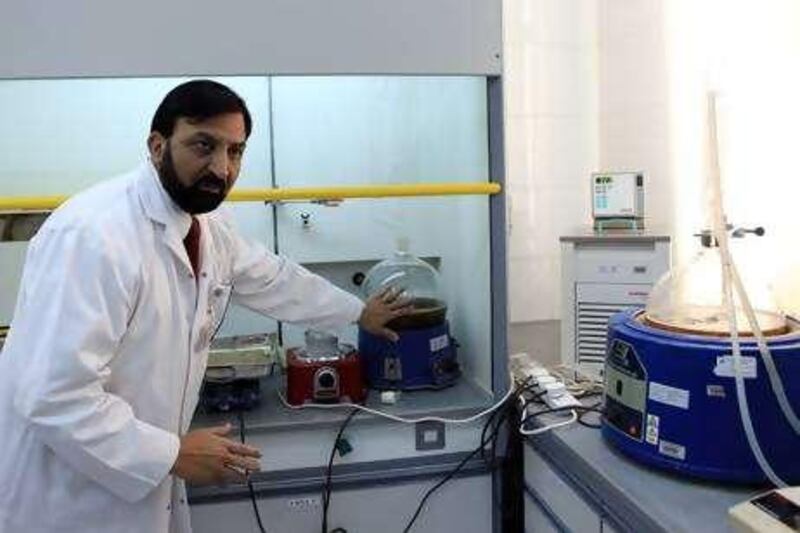The Zayed Complex for Herbal Research and Traditional Medicine is a botanist's dream. Every cupboard is crammed with dried herbs and every shelf filled with jars of obscure-looking seeds and plants.
The pungent smell of rich foliage is almost overwhelming and fills every room in the cavernous complex. To the unassuming, there are no obvious indications that this apothecary-type place is an important weapon in the country's fight against illegal and dangerous medicines. Its research library is already filled with more than 4,000 dried samples that have been tested for their efficacy and toxicity.
The herbs, which grow naturally in the Emirates, can be used for anything from diabetes and asthma to eczema and digestive problems. The centre was set up on the instructions of Sheikh Zayed, the founding President of the UAE, and has drawn up an encyclopedia of the nation's medicinal plants as a reference guide for doctors. "We want to make it safe by using scientific, evidence-based research," says Dr Mazen Ali Naji, general manager of the centre and a trained doctor.
"We want it to be safe - no one should take chances. [Plants] can be very useful if they are used properly." The centre is now planning a quality control lab to test and report on the huge numbers of existing and new herbal medicines entering the market. Recently a growing number of people have taken advantage of the trust put in herbal remedies. It is not uncommon for modern "herbal medicines" to contain chemicals, Dr Naji says, which goes against the main principle of natural products.
"People will lose trust in the herb and say it's not effective," Dr Naji says. "If they are taking something in the wrong quantities or mixing with other things, it may not work, or worse, it could do harm." The complex is heavily involved in regulating, testing and inspecting herbal products. It receives samples from the country's health authorities and, based on the results, the relevant authority will decide whether it should be on sale.
Many Emiratis still shun modern medicines in favour of those used by their ancestors. The relationship between beliefs and heritage is particularly strong in the Middle East, Dr Naji explains, and younger generations still trust herbal remedies used by their parents and grandparents. Some traditional remedies use garlic or sesame oil, while others use less well-known plants that grow naturally in the desert, mountains or wadis.
The sidr tree, for example, is used to treat chest and stomach problems. The kufer plant, which grows on dry slopes and damp areas of the mountains in the northern emirates and Al Ain, is used as a laxative and diuretic. Volume one of the encyclopedia contains around 30 plants. Each listing includes a physical description, traditional uses, chemical components and details of any previous scientific studies. It is the first volume of many, Dr Naji says.
The complex, which is a collaboration centre of the World Health Organisation, is in Mafraq and has a team of around 15 full-time staff. A further 25 staff are expected to work in the new laboratory when it opens early next year. Dr Mohammad Kamil, an associate professor at the complex, has worked in the existing lab for almost 14 years. "It is a very interesting job," he says. "I have a chemistry background but did my PhD in natural products so this is an ideal place for me.
"You will find very few people in the world who are satisfied with their job, but I'm one of them." For those who doubt the effects of herbal medicines, Dr Naji is the man to convince them. "Plants clearly have an effect on the body," he says. "For acute pain someone should always visit their doctor. But they have been proven to help with chronic diseases." Those wanting to test his theory should not treat the exercise lightly.
"One man went to pick a plant he thought would cure something simple," he recalls. "He picked the wrong one and is now paralysed. "Herbal medicines should not be used without the proper guidance. I always recommend taking single herb remedies, do not mix them." The complex recently printed a booklet with photographs and information on some of the common toxic plants in the country. "We need awareness and education," Dr Naji says. "You can't stereotype those who use herbal medicines by saying, 'It's only people in Liwa and not the city'. That's not true. Many, many people use them so we want them to know how to use them safely. "We want to keep trust in herbal medicines while keeping people safe." @Email:munderwood@thenational.ae
Nerium oleandar (al Dafla) grows in deep rocky valleys or is cultivated on roadsides. It can cause vomiting, drowsiness, tremors, allergic reactions on the skin and eyes, and even induce a coma. Lantana camara (Lantana) is an ornamental perennial shrub cultivated in public and private gardens. The plant and its berries can cause jaundice, constipation, diarrhoea, mouth and nostril lesions and ulcers in cheeks and gums. Abrus Precatorius (Hab ul-Aroos) is a wild licorice perennial shrub with red seeds. The seeds contain a toxic compound that is fatal in a dose as low as three milligrams. Contact with eyes can cause blindness. Ricinus communis (al Kharwoa) is a perennial ornamental herb. Leaves and seeds are extremely toxic. Six seeds can kill a child and 10 can kill an adult. In case of suspected poisoning, call the Health Authority-Abu Dhabi Poison Drug and Information Centre on 800 424.





